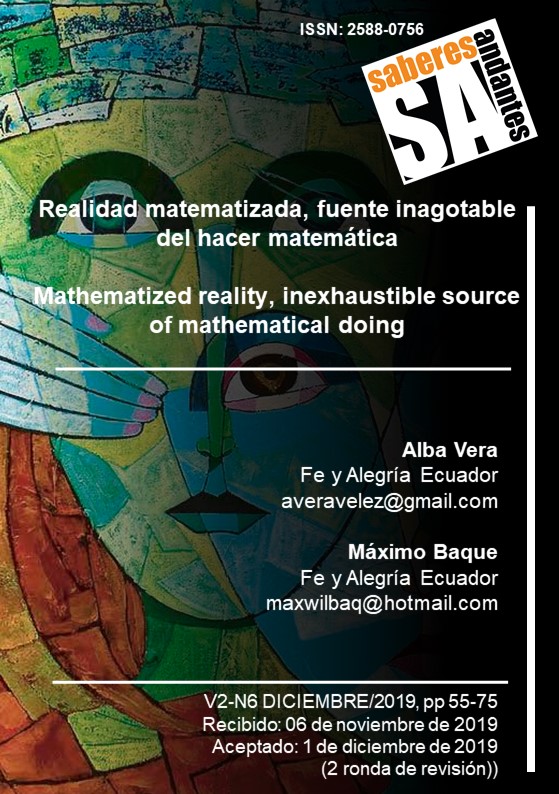Mathematized reality, inexhaustible source of mathematical doing
DOI:
https://doi.org/10.53387/sa.v2i6.49Keywords:
realistic mathemathics, teaching / learning, mixed learning community, logical-critical mathematical thinkingAbstract
It is undeniable that the teaching of mathematics, characterized by mechanical, memoristic, decontextualized and abstract repetition, demands urgent changes; that is why, a research process was started, for the purpose of positioning a different way of teaching mathematics with a creative, playful, realistic and interdisciplinary proposal. The research led to implement an action plan that had to be built from practice to raise awareness, and under the Mixed Learning Community (CAM) modality, to a group of teachers, representatives of families and students about the importance of incorporating new ways of teaching mathematics. It contributes to encourage the development of logical-critical, creative, proactive thinking in the different educational actors. This CAM experience was carried out in Unidades Educativas Oswaldo Álvarez Barba, La Dolorosa and José de Anchieta by raising awareness, shaping and implementing learning communities in the area of mathematics.
Downloads
References
Bressan, A., Zolkower, B. E. T. I. N. A., & Gallego, M. F. (2004). Los principios de la educación matemática realista. Reflexiones teóricas para la educación matemática. Versión digital consultada en junio de 2018, en: https://isfdajullon-lrj.infd.edu.ar/aula/archivos/repositorio/750/923/DOC1-principios-de-educacion-matematica-realista.pdf
Centro de Formación e Investigación (2017), Curso de investigación. Módulo dos. El método IAP. Quito: CFI.
Fals Borda, O. (1976). Ciencia propia y colonialismo intelectual. Bogotá: Punta de lanza.
Fe y Alegría Ecuador (2016). Horizonte Pedagógico Pastoral. Quito: Fe y Alegría Ecuador.
Freire, P. (200718). Pedagogía del oprimido. Madrid: Siglo XXI. Traducción de Jorge Mellado
Freire, P., & Shor, I. (2014). Miedo y Osadía. La cotidianidad del docente que se arriesga a practicar una pedagogía transformadora. Buenos Aires: Siglo XXI.
Freudenthal, H. (2002). Revisiting Mathematics Education. London: KLUWER ACADEMIC PUBLISHERS.
Gravemeijer, KPE. y Terwel J. (2000) HANS FREUDENTHAL, un matemático en Didáctica y teoría curricular. J. Currículo Studies, vol. 32, nº6, 777-796 (Traducción interna para el Grupo Patagónico de Didáctica de la Matemática a cargo de Norma Saggesse, Fernanda Gallego y Ana Bressan. 2004) V. digital consultada en noviembre de 2017 en: https://www.researchgate.net/publication/241866337_HANS_FREUDENTHAL_un_matematico_en_Didactica_y_teoria_curricular
MINEDUC, (2016) Educación General Básica. Currículo de los Niveles de Educación Obligatoria. Subnivel ELEMENTAL. Quito: MINEDUC. Consultado en: https://educacion.gob.ec/wp-content/uploads/downloads/2019/09/EGB-Eelemental.pdf

Downloads
Published
How to Cite
Issue
Section
License
Copyright (c) 2019 Saberes Andantes

This work is licensed under a Creative Commons Attribution-NonCommercial-ShareAlike 4.0 International License.
1. Derechos de autor
Las obras que se publican en Saberes Andantes están sujetas a los siguientes términos:
1.1. Saberes Andantes, conserva los derechos patrimoniales (copyright) de las obras publicadas, favorece y permite la reutilización de las mismas bajo la licencia Licencia Creative Commons 4.0 de Reconocimiento-NoComercial-CompartirIgual 4.0, por lo cual se pueden copiar, usar, difundir, transmitir y exponer públicamente, siempre que:
1.1.a. Se cite la autoría y fuente original de su publicación (revista, editorial, URL).
1.1.b. No se usen para fines comerciales u onerosos.
1.1.c. Se mencione la existencia y especificaciones de esta licencia de uso.








